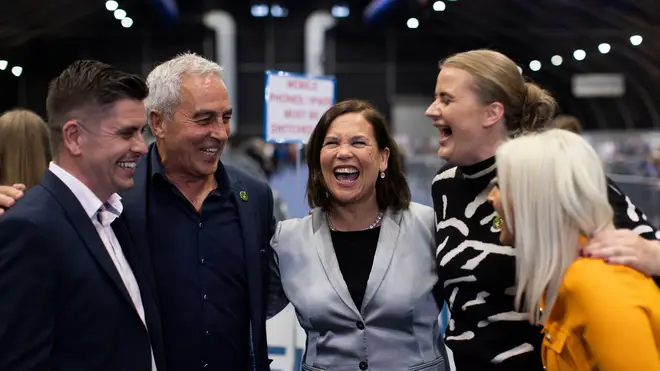
Henry Riley 7pm - 10pm
7 May 2022, 01:19 | Updated: 7 May 2022, 06:40

A Sinn Fein victory has stoked fears of a united Ireland being on the cards within the next five years, as counting continues in Northern Ireland.
Unionists warned on Friday that Sinn Fein becoming the biggest party in Stormont as a result of the Northern Ireland elections could cost the country its place in the UK.
It came after the republican party secured 29 per cent of first preference votes, compared with 21.3 per cent for the DUP, 13.5 per cent for Alliance, 11.2 per cent for the Ulster Unionists and 9.1 per cent for the SDLP.
It would be the first time a party wanting a united Ireland has won the elections, after more than a century of unionist and protestant majorities in Northern Ireland.
For over 20 years, the DUP has been the country's biggest party.
When counting was suspended on Friday night, just 49 of the 90 seats had been filled following a lengthy process, with only four out of 18 constituency counts completed.
Read more: Local Elections 2022: Which councils have changed hands?
Read more: Defiant Boris vows to carry on after ‘tough night’ for Tories in local elections
A historic day.
— Michelle O’Neill (@moneillsf) May 6, 2022
We will work hard for everyone. pic.twitter.com/WJi2slw5WW
Michelle O'Neill, the leader of Sinn Fein, said: "We did say this was going to be an election about the future. It is potentially going to be a historic election for many reasons."
Despite planning for reunification, Ms O'Neill played down the idea of an immediate border poll, instead focusing her campaign on healthcare and the cost of living.
Sir Jeffrey Donaldson, the DUP leader, said unionism "simply cannot afford the divisions that exist" because it harmed its "ability to win elections".
Meanwhile, Tory Party chairman Oliver Dowden told Sky he was confident the Government could "make the case" for Northern Ireland remaining in the UK but stressed a vote would only take place if there was "sustained majority" for a united Ireland.
"That's beyond the power of the United Kingdom Government," he said.
"We would have to allow that to happen were it the case".
He went on to say: "Of course we would honour the provisions of the Good Friday Agreement if that was required, but I'm confident that we will be able to make the case for Northern Ireland remaining in the United Kingdom should that that arise, but I don't think we're at that stage".
Some 239 candidates stood across 18 constituencies.
Five Assembly seats are up for grabs in each of the 18 constituencies.
Northern Ireland uses the single transferable vote proportional representation electoral system.